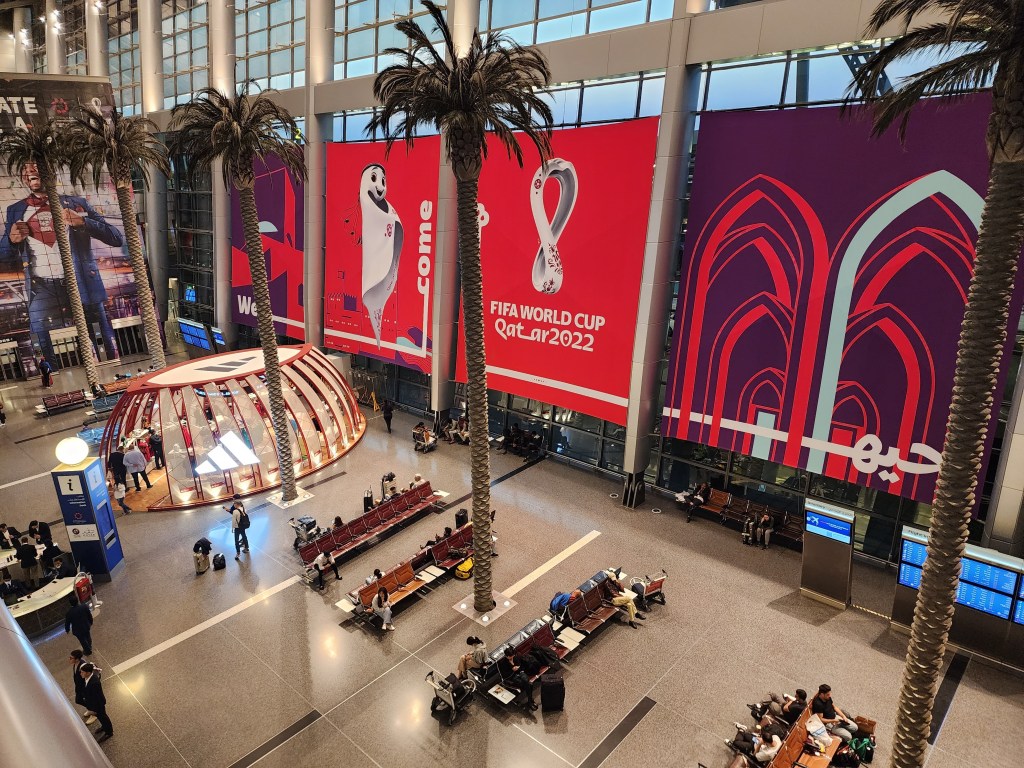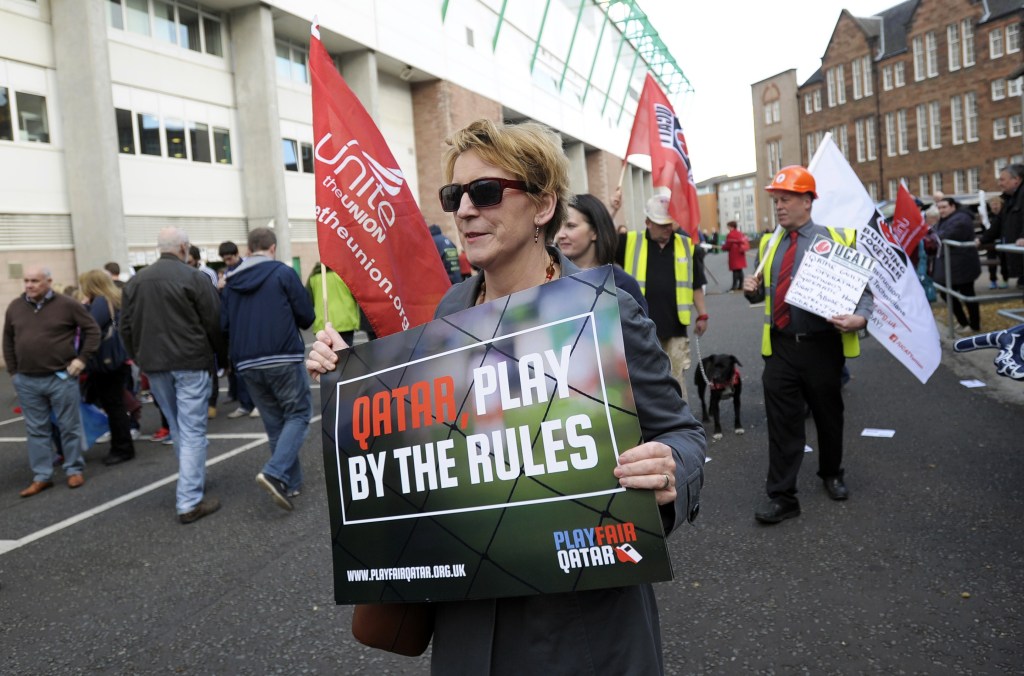Grace Forrest is the Founding Director of Walk Free, an international human rights organisation working to eradicate modern slavery.

While football fans are sitting back and enjoying the 2022 FIFA World Cup, others are carrying out the sombre task of putting to rest the bodies of loved ones who died in preparation for the global showpiece of the ‘beautiful game’.
Banners of football stars hanging from the side of buildings flap in the wind while down below, construction workers gather in the streets of Qatar’s capital, Doha, demanding they be paid their stolen wages. Since it was announced that Qatar would be hosting the highly anticipated tournament, thousands of workers, mostly migrants, have reported horrendous working conditions, stolen wages, and work-related deaths leading up to the most expensive World Cup yet.
Despite a chorus of unprecedented criticism, the shocking reports of forced labour among migrants working on the construction of Qatar’s World Cup reflect a wider issue: slavery is not a thing of the past. In fact, it is more common today than at any other time in history.
Qatar has been wrapped up in international criticism due to multiple allegations of human rights abuses against their migrant workers. However, this is far from the first time the world has seen such a strong reliance on forced labour. In fact, with almost 30 million people living in forced labour globally, it could be argued it is the foundation of our modern economy. Whether it be construction, manufacturing, agriculture, or domestic duties, forced labour touches virtually every part of the workforce.
The 2021 Global Estimates of Modern Slavery, produced by Walk Free, the International Labor Organisation, and the International Organisation for Migration, indicate there are almost 50 million people living in modern slavery today, with over half of those in situations of forced labour. That equates to more people living in slavery today than during the time of the transatlantic slave trade, one of the darkest chapters in human history. And the legacy of which persists today through the exploitation and dehumanisation of workers in low-income countries, to largely benefit wealthier, typically Western, countries.
Sadly, the mistreatment of workers during the construction of the stadiums and infrastructure for the 2022 World Cup is just one example amongst an ever-growing pile of case studies – from the technology we all rely on every day, to the coffee, tea and chocolate on the shelves of every supermarket. Businesses across all sectors are fuelled by exploitation because it is enveloped in the way our globalised supply chains function.

Reportedly more than 6,500 migrant workers from South Asia have died in Qatar since it won the right to host the World Cup more than 10 years ago.[1] The unprecedented building programme to prepare for the tournament has included the construction of seven new stadiums, a new airport, a metro system, a series of roads and about 100 new hotels[2]. A significant number of workers have been severely injured, while others report weeks’ worth of unpaid wages, and extremely dangerous working conditions. The majority of those who have died due to hazardous working environments and work-related injuries are from India, Pakistan, Nepal, Bangladesh, and Sri Lanka. Many workers were recruited for jobs only once the right to host was announced.[3][4]
Reports of Qatar’s mistreatment of migrant workers have not just surfaced in the months leading up to the tournament. In 2016, Amnesty International accused companies within the host country of abusing their migrant workers, with workers reportedly madeto live in squalid and overcrowded accommodations, pay exorbitant recruitment fees, had their wages withheld, and passports confiscated[5] – all situations which constitute modern slavery. Many migrant employees working on the construction of football stadiums said they were being deceived about the type of work and their pay, as well as being threatened for complaining about conditions.[6] Reports of forced labour among migrant workers across Qatar became known six years ago, yet the mistreatment of workers continued well beyond this.
Migrant workers continue to be at much higher risk of experiencing forced labour, up to three times more likely than non-migrant workers. With limited access to local networks and information, migrants frequently need to look to third party sources. If information about labour rights and protection is not readily available, then employees can easily exploit workers. Migrants are also highly vulnerable when fleeing situations of violence and conflict, with their vulnerability persisting when disconnected from community and family support structures. Additionally, many migrants gain employment through recruitment agencies that rely on fraudulent practices, like charging exorbitant fees so that clients are forever bonded by debt. Although migrant vulnerability has been highlighted by Qatar’s World Cup, this work experience is not confined to one part of the world. In fact, both Australia and New Zealand have been home to exploitation across their migrant workforce. That is why it is imperative that the Australian Modern Slavery Act of 2018 be strengthened to tackle this now definitely growing problem.
There has been much talk about the legacy left behind for host countries of the FIFA World Cup. For Qatar, this means making history by being the first country in the Middle East to host one of the world’s greatest sporting events. This means reaping the enormous economic benefits of hosting and garnering international attention. Since its right to host was announced, Qatar has been thrusted onto the global sporting stage, already becoming the destination for future major events. Qatar is set to host the 2023 Asian Football Cup and the 2030 Asian Games, while it is bidding for the Summer Olympics.
However, underneath the legacy of the glamourous stadiums and futuristic hubs, are thousands who died in the name of the beautiful game. Long after the ticket holders have witnessed the winning country lift the trophy and returned home, families of migrants will continue to mourn their lost ones. They will continue to live in deep economic uncertainty with their main breadwinner gone. How do we ensure that our pleasure in loving sport, does not come at the cost of the suffering of those who build the very stadiums we cheer in? How do we ensure games are not literally built on the same slavery record as the World Cup? If the true legacy of exploitation is never recognised, who is to say this will not remain the foundation for these games, not only in Qatar but across the globe.
With almost 50 million people living in modern slavery today, we need urgent, and immediate action. Confronting modern slavery requires addressing the world’s deep power imbalances. Modern slavery thrives off injustice, hence we must address inequality – especially where it is happening in plain sight. The 2022 FIFA World Cup serves as an alarm bell, one that is loud and clear, demanding our attention. While many have tried to hold Qatar accountable for the human rights abuses committed over the last 10 years, we need to demand that same accountability from every business, organisation, and government around the world.
Grace Forrest is the Founding Director of Walk Free, an international human rights organisation working to eradicate modern slavery.
[1] https://www.theguardian.com/global-development/2021/feb/23/revealed-migrant-worker-deaths-qatar-fifa-world-cup-2022
[2] https://www.bbc.com/news/world-middle-east-35931031
[3 and 4] https://www.theguardian.com/global-development/2021/feb/23/revealed-migrant-worker-deaths-qatar-fifa-world-cup-2022
[5] https://www.bbc.com/news/world-middle-east-35931031
[6] https://www.bbc.com/news/world-middle-east-35931031